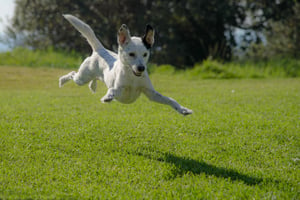Dogs chewing their tails is a common behavior that can be caused by a variety of reasons. This...
Why Does My Dog Chew the End of His Tail?
Do you have a dog that constantly chews the end of his tail? It can be a frustrating habit, but it's important to understand why your pup is doing it. In this article, we'll look at the different reasons why dogs may chew the end of their tails and what you can do to stop this behaviour.
Common Causes of Tail Chewing
There are a number of reasons why your dog may be chewing the end of his tail. The most common causes include:
- Allergy or skin irritation: Dogs may chew the end of their tails due to an allergic reaction or skin irritation. This is especially common if your pup has recently had a flea or tick treatment or has been exposed to an allergen.
- Anxiety or boredom: Dogs may chew the end of their tails out of boredom or anxiety. If your pup is feeling stressed or anxious, he may resort to chewing his tail as a coping mechanism.
- Pain or discomfort: If your pup is in pain or discomfort, he may chew the end of his tail as a way to relieve the discomfort. This could be due to an injury, arthritis, or another medical condition.
- Habit: Some dogs may simply have a habit of chewing the end of their tails out of boredom. This is especially common in puppies and young dogs.
How to Stop a Dog from Chewing the End of His Tail
Once you've identified the cause of your pup's tail chewing, it's time to take steps to stop it. Here are some tips to help you get started:
- Provide plenty of exercise: Make sure your pup is getting enough exercise each day. A tired pup is less likely to resort to tail chewing out of boredom or anxiety.
- Create a calm environment: If your pup is anxious or stressed, create a calm environment for him. This may include providing a comfortable bed, a quiet space, and plenty of playtime.
- See your veterinarian: If your pup is in pain or discomfort, take him to the veterinarian for a check-up. Your vet can help diagnose and treat any underlying medical conditions.
- Treat allergies: If your pup is having an allergic reaction, your veterinarian can help you identify the allergen and provide treatments to help relieve the symptoms.
- Use a taste deterrent: If your pup is chewing his tail out of habit, use a taste deterrent to discourage the behaviour. You can purchase taste deterrents at your local pet store or online.
When to See a Veterinarian
It's important to keep an eye on your pup's tail chewing behaviour and take note of any changes. If the behaviour is getting worse or your pup seems to be in pain or discomfort, it's best to take him to the vet for a check-up. Your veterinarian can help diagnose any underlying medical conditions and provide treatments to help relieve the symptoms.
Conclusion
Tail chewing can be a frustrating and potentially dangerous behaviour for your pup. By understanding the common causes of tail chewing and taking steps to stop it, you can help keep your pup safe and healthy. If you're concerned about your pup's tail chewing behaviour, it's best to take him to the vet for a check-up.



